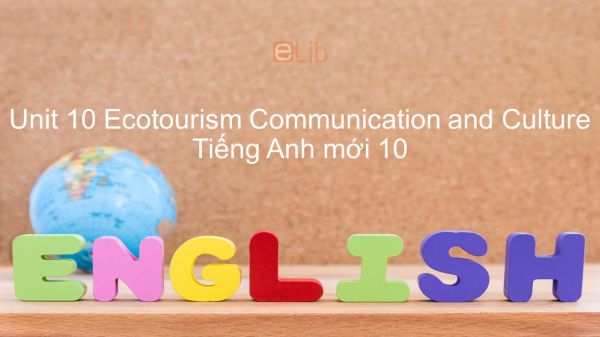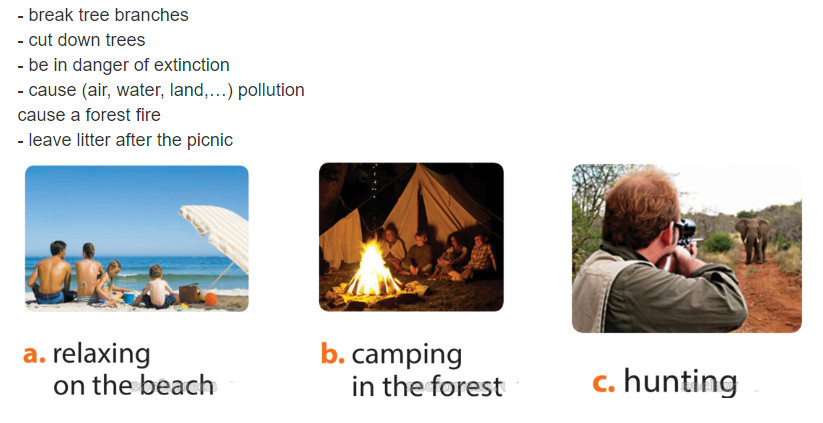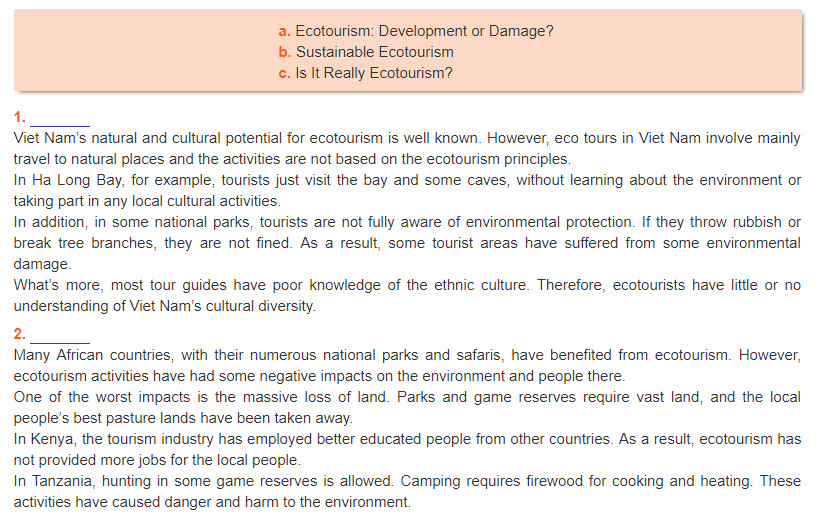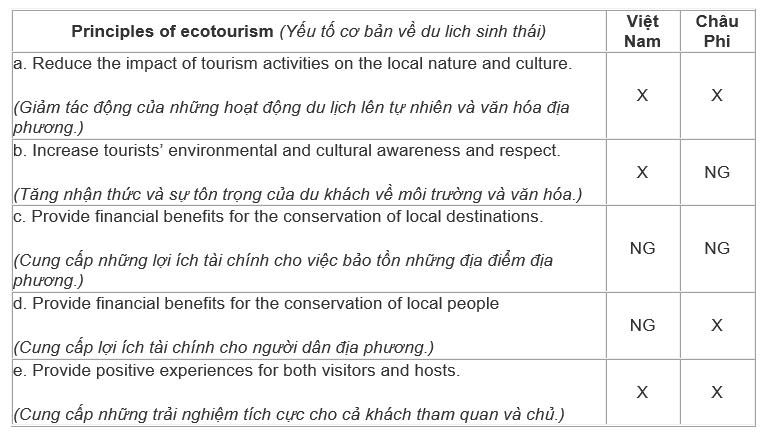Unit 10 lớp 10: Ecotourism - Communication and Culture
Nhằm giúp các em nâng cao kĩ năng giao tiếp và hiểu thêm về văn hóa nước ta cũng như các nước khác, phần Communication and Culture giới thiệu đến các em thông tin về các địa điểm du lịch được đề cập trong Unit 10 và hướng dẫn các em đọc hiểu về các vấn đề trong ngành du lịch sinh thái.
Mục lục nội dung

Unit 10 lớp 10: Ecotourism - Communication and Culture
1. Communication
1.1. Task 1 Unit 10 lớp 10
If you have a chance to go on an eco tour, which destination in Viet Nam will you choose? Read the information about the places mentioned in this unit (Bach Ma National Park, Sa Pa, Central Highlands, Can Gio Biosphere Reserve, the Mekong Delta, etc.). Decide on one place and take notes. Complete the diagram. (Nếu em có một cơ hội đi một chuyến du lịch sinh thái đến một địa điểm ở Việt Nam, em sẽ chọn ở đâu? Đọc thông tin về những nơi được đề cập trong bài này (Công viên Quốc gia Bạch Mã, Sa Pa, Tây Nguyên, Khu bảo tồn Sinh quyển Cần Giờ, Đồng bằng sông Mê Kông). Quyết định một nơi và ghi chú. Hoàn thành biểu đồ sau.)

Guide to answer
Destination: Sa Pa (Địa điểm: Sa Pa)
- The most enjoyable activities on the tour: visit Cat Cat village, go camping in the forest
(Những hoạt động vui nhất trong chuyến đi: thăm bản Cát Cát, đi cắm trại trong rừng)
- The benefits for me: know more about local people’s life and traditions, relax more, enjoy nature
(Lợi ích cho tôi: biết nhiều hơn về cuộc sống và truyền thống của người dân địa phương, thư giãn hơn, tận hưởng thiên nhiên)
- The benefits for the environment and local people: more jobs and income for local people, more money for local community to preserve nature
(Lợi ích cho môi trường và người dân địa phương: nhiều công việc và thu nhập hơn cho người dân địa phương, nhiều tiền hơn cho cộng đồng địa phương để bảo tồn thiên nhiên.)
1.2. Task 2 Unit 10 lớp 10
Work with a partner. Tell him / her about your choice of destination and give reasons. (Làm việc với bạn em. Nói cho cậu ấy/cô ấy về lựa chọn địa điểm của em và đưa ra lý do.)
Student A: Which destination will you choose if you have a chance to go on an eco tour?
Student B: I’ll visit Sa Pa.
Student A: Why?
Student B: Because there are a lot of enjoyable activities to do there such as visiting Cat Cat village and going camping in the forest.
Student A: Anything else?
Student B: Well, I could also benefit a lot from the tour. I could learn more about local people’s life and traditions, relax more, as well as enjoy nature.
Tạm dịch:
Học sinh A: Điểm đến nào bạn sẽ chọn nếu có bạn cơ hội đi du lịch sinh thái?
Học sinh B: Tôi sẽ đi thăm Sa Pa.
Học sinh A: Tại sao?
Học sinh B: Vì có rất nhiều hoạt động thú vị ở đó như thăm bản Cát Cát và cắm trại trong rừng.
Học sinh A: Còn gì nữa không?
Học sinh B: À, tôi cũng có thể được lợi rất nhiều từ chuyến tham quan. Tôi có thể tìm hiểu thêm về cuộc sống và truyền thống của người dân địa phương, thư giãn nhiều hơn cũng như tận hưởng thiên nhiên.
2. Culture
2.1. Task 1 Unit 10 lớp 10
Look at the pictures and discuss how the tourism activities in each one may affect the environment Use the words or expressions below. (Nhìn vào hình và thảo luận cách những hoạt động du lịch trong mỗi hình có thể ảnh hưởng đến môi trường. Sử dụng những từ hoặc câu từ bên dưới.)

Guide to answer
1. relaxing on beaches: Tourists may leave litter on the beach which may cause land and water pollution.
2. camping in the forest: Making a campfire requires breaking tree branches or cutting down for firewood. Campfires may cause forest fires, if they are left unattended.
3. hunting: Hunting animals may lead to their extinction. Endangered animals can be in danger of extinction.
Tạm dịch:
1. Thư giãn trên bãi biển: Du khách có thể xả rác trên bãi biển gây nên ô nhiễm đất và nước.
2. Cắm trại trong rừng: Đốt lửa trại cần đến việc bẻ những nhánh cây to hoặc chặt xuống để làm củi đốt. Lửa trại có thể gây cháy rừng nếu chúng ta để co chúng tự tắt.
3. Đi săn: Săn thú có thể gây tiệt chủng loài thú đó. Những động vật đang bị nguy hại có thể ở trong nguy cơ tiệt chủng.
2.2. Task 2 Unit 10 lớp 10
Read two articles about some problems with ecotourism in Viet Nam and Africa. Then match the titles with the articles. One title is extra. (Đọc hai bài báo về vài vấn đề với du lịch sinh thái ở Việt Nam và châu Phi. Sau đó nối tựa với bài báo. Có dư một tựa đề.)

Guide to answer
1 - c 2 - a
Tạm dịch:
1. Liệu đó có thực sự là du lịch sinh thái không?
Tiềm năng tự nhiên và văn hóa cho du lịch sinh của Việt Nam đã được biết đến rộng rãi. Tuy nhiên, các chuyến du lịch sinh thái ở Việt Nam chủ yếu bao gồm du lịch đến các địa điểm tự nhiên và các hoạt động không dựa trên nguyên tắc du lịch sinh thái.
Vịnh Hạ Long, như một ví dụ, khách du lịch chỉ tham quan vịnh và một số hang động mà không tìm hiểu về môi trường hay tham gia bất kỳ hoạt động văn hóa địa phương nào.
Thêm vào đó, tại một số vườn quốc gia, khách du lịch chưa có đủ ý thức bảo vệ môi trường. Nếu họ ném rác hoặc bẻ cành cây, họ không bị phạt. Kết quả là một số khu du lịch đã bị một số thiệt hại về môi trường.
Hơn nữa, hầu hết các hướng dẫn viên du lịch đều có kiến thức nghèo nàn về văn hóa dân tộc. Do đó, những người làm du lịch sinh thái có rất ít hoặc không có hiểu biết gì về sự đa dạng văn hóa của Việt Nam.
2. Du lịch sinh thái: Phát triển hay Thiệt hại?
Nhiều quốc gia châu Phi, với số lượng lớn vườn quốc gia và các khu du lịch, đã được hưởng lợi từ du lịch sinh thái. Tuy nhiên, các hoạt động du lịch sinh thái đã có một số tác động tiêu cực đến môi trường và con người ở đó.
Một trong những tác động tồi tệ nhất là mất rất nhiều đất. Các công viên và khu bảo tồn trò chơi đòi hỏi phải có đất đai rộng lớn và những vùng đất đồng cỏ tốt nhất của người dân địa phương đã bị lấy đi.
Ở Kenya, ngành du lịch đã tuyển dụng những người có trình độ học vấn tốt hơn từ các quốc gia khác. Kết quả là, du lịch sinh thái đã không cung cấp thêm việc làm cho người dân địa phương.
Ở Tanzania, việc săn bắn trong một số khu dự trữ trò chơi được cho phép. Việc cắm trại cần có củi cho việc nấu nướng và sưởi ấm. Những hoạt động này đã gây nguy hiểm và gây hại cho môi trường.
2.3. Task 3 Unit 10 lớp 10
Below are some principles of ecotourism. Put a cross if it has not been applied, and write NG (Not given) if the articles don't mention it. (Bên dưới là một số nguyên tắc của du lịch sinh thái. Đặt dâu chéo (X) nếu nó chưa được áp dụng và viết NG nếu bài không để cập.)

2.4. Task 4 Unit 10 lớp 10
Work in pairs. Discuss what should be done to restrict the harm or damage tourists may cause to the environment and local people in Viet Nam and Africa. (Làm theo cặp. Thảo luận cái gì nên được làm để giới hạn tác hại hoặc phá hoại mà du khách có thể gây ra cho môi trường và người dân địa phương ở Việt Nam và châu Phi.)
Guide to answer
- More efforts (such as producing educational brochures and TV programmes about ecotourism) need to be made to fully inform and educate tourists on the environment and social impacts of ecotourism.
- Moreover, there should be regulations and laws banning the promotion of unsustainable ecotourism Project and activities that may harm the local cultures and nature (such as Project to cut down trees to build hotels and hunting activities).
Tạm dịch:
- Hầu hết những nỗ lực (như là sản xuất những cuốn sách giáo dục và những chương trình truyền hình về du lịch sinh thái) cần được thực hiện để thông tin đầy đủ và giáo dục du khách về môi trường và những tác động xã hội của du lịch sinh thái.
- Hơn nữa, nên có những quy định và luật cấm khuyến mãi những dự án du lịch sinh thái không bền vững và những hoạt động mà gây hại cho văn hóa và thiên nhiên địa phương (như là dự án chặt cây để xây khách sạn và những hoạt động săn bắn).
3. Practice Task 1
Rearrange the sentences to make meaningful sentences
Question 1: late/go/now/home/should/you/ it’s/and
A. It’s you should go late and home now.
B. It’s late you and should go home now.
C. It’s late and you should go home now.
D. It’s should go home and you late now
Question 2: give/the present/tomorrow/we/him/will
A. Tomorrow we will give him the present.
B. We will tomorrow give hime present the.
C. Tomorrow we give will hime the present.
D. Tomorrow we will give the present him.
Question 3: have/at the station/her/we/just met
A. We just have met her at the station.
B. We have just met her at the station.
C. We have met just her at the station.
D. We have just her met at the station.
Question 4: he/unhealthy/was/last week/./he/in hospital/looks
A. He looks in hospital. He was unhealthy last week.
B. He unhealthy. He was looks in hospital last week.
C. He looks unhealthy. He was in hospital last week.
D. He looks unhealhy.He was hospital in last week.
Question 5: weeks/in France/spend/I/will/next year/my holiday/for two
A. Next year I spend will my holiday in France for 2 weeks.
B. Next year I will spend in France my holiday for 2 weeks.
C. Next year I will spend for 2 weeks my holiday in France.
D. Next year I will spend my holiday in France for 2 weeks.
4. Practice Task 2
Choose the letter A, B, C or D to answer these following questions
Most of us are interested in one kind of sport or another, even if we don't go in for it actively. Lots of people take up a particular sport at an early age, for example tennis, skiing, or ice-skating. If they get up to a suitably high standard, they may go in for local competitions or even championships. But special training is hard work and most young people don't keep it up. Many of them opt out when they come up against tough competition.
To become a professional in any sport, you have to go through with a strict training schedule. And it's not easy! It means doing without some of life's little pleasures, too. For example, to build up your physical strength you may have to stick to a special diet and give up some of your favorite foods. Smoking and alcohol are out, and to keep fit you have to work out regularly every day.
Sometimes it all pays off, but the road to success is long and there are no guarantees. No wonder that countless young talents decide to settle for a regular job instead, and, as far as professional sport is concerned, for looking on as spectators.
Question 1: The term of “go in for” in the passage means _________
A. give up B. participate in C. begin D. like
Question 2: According to the passage, which of the following statements is TRUE about special training?
A. It is not easy work.
B. It hardly works.
C. Most young people try to work out regularly.
D. Most young people strictly follows a special diet
Question 3: The word “opt out” in the passage means _______
A. struggle B. fight C. give up D. change
Question 4: To become professional in any sports, your strict training schedule would probably involve _________
A. enjoying all life’s pleasures B. eating all kinds of foods
C. sticking to a special diet D. smoking and drinking alcohol
Question 5: According to the passage, which of the following statements is true?
A. Few people take up a particular sport at an early age.
B. The road to success in sports is long but there are guarantees.
C. All of the people who play some sports can go in for local competitions or even championships.
D. There are many young talents who decide to settle for a regular job.
Để nắm các từ vựng và các điểm ngữ pháp giúp ích trong quá trình giao tiếp, mời các em đến với phần luyện tập trắc nghiệm Unit 10 Communication and Culture Tiếng Anh 10 mới sau đây.
6. Conclusion
Kết thúc bài học Unit 10 Tiếng Anh lớp 10 mới – Communication and Culture, các em học sinh cần nắm được thông tin về các địa điểm du lịch nổi tiếng của Việt Nam, tạo đoạn hội thoại và luyện tập nói; đồng thời đọc hiểu về các vấn đề trong ngành du lịch sinh thái ở Việt Nam và châu Phi.
Tham khảo thêm
- doc Unit 10 lớp 10: Ecotourism - Getting Started
- doc Unit 10 lớp 10: Ecotourism - Language
- doc Unit 10 lớp 10: Ecotourism - Reading
- doc Unit 10 lớp 10: Ecotourism - Speaking
- doc Unit 10 lớp 10: Ecotourism - Listening
- doc Unit 10 lớp 10: Ecotourism - Writing
- doc Unit 10 lớp 10: Ecotourism - Looking Back
- doc Unit 10 lớp 10: Ecotourism - Project




